#apologetics
Text
The impoverished imagination of neoliberal climate “solutions

This morning (Oct 31) at 10hPT, the Internet Archive is livestreaming my presentation on my recent book, The Internet Con.

There is only one planet in the known universe capable of sustaining human life, and it is rapidly becoming uninhabitable by humans. Clearly, this warrants bold action – but which bold action should we take?
After half a century of denial and disinformation, the business lobby has seemingly found climate religion and has joined the choir, but they have their own unique hymn: this crisis is so dire, they say, that we don't have the luxury of choosing between different ways of addressing the emergency. We have to do "all of the above" – every possible solution must be tried.
In his new book Dark PR, Grant Ennis explains that this "all of the above" strategy doesn't represent a change of heart by big business. Rather, it's part of the denial playbook that's been used to sell tobacco-cancer doubt and climate disinformation:
https://darajapress.com/publication/dark-pr-how-corporate-disinformation-harms-our-health-and-the-environment
The point of "all of the above" isn't muscular, immediate action – rather, it's a delaying tactic that creates space for "solutions" that won't work, but will generate profits. Think of how the tobacco industry used "all of the above" to sell "light" cigarettes, snuff, snus, and vaping – and delay tobacco bans, sin taxes, and business-euthanizing litigation. Today, the same playbook is used to sell EVs as an answer to the destructive legacy of the personal automobile – to the exclusion of mass transit, bikes, and 15-minute cities:
https://thewaroncars.org/2023/10/24/113-dark-pr-with-grant-ennis/
As the tobacco and car examples show, "all of the above" is never really all of the above. Pursuing "light" cigarettes to reduce cancer is incompatible with simply banning tobacco; giving everyone a personal EV is incompatible with remaking our cities for transit, cycling and walking.
When it comes to the climate emergency, "all of the above" means trying "market-based" solutions to the exclusion of directly regulating emissions, despite the poor performance of these "solutions."
The big one here is carbon offsets, which allows companies to make money by promising not to emit carbon that they would otherwise emit. The idea here is that creating a new asset class will unleash the incredible creativity of markets by harnessing the greed of elite sociopaths to the project of decarbonization, rather of the prudence of democratically accountable lawmakers.
Carbon offsets have not worked: they have been plagued by absolutely foreseeable problems that have not lessened, despite repeated attempts to mitigate them.
For starters, carbon offsets are a classic market for lemons. The cheapest way to make a carbon offset is to promise not to emit carbon you were never going to emit anyway, as when fake charities like the Nature Conservancy make millions by promising not to log forests that can't be logged because they are wildlife preserves:
https://pluralistic.net/2022/03/18/greshams-carbon-law/#papal-indulgences
Then there's the problem of monitoring carbon offsetting activity. Like, what happens when the forest you promise not to log burns down? If you're a carbon trader, the answer is "nothing." That burned-down forest can still be sold as if it were sequestering carbon, rather than venting it to the atmosphere in an out-of-control blaze:
https://pluralistic.net/2021/07/26/aggregate-demand/#murder-offsets
When you bought a plane ticket and ticked the "offset the carbon on my flight" box and paid an extra $10, I bet you thought that you were contributing to a market that incentivized a reduction in discretionary, socially useless carbon-intensive activity. But without those carbon offsets, SUVs would have all but disappeared from American roads. Carbon offsets for Tesla cars generated billions in carbon offsets for Elon Musk, and allowed SUVs to escape regulations that would otherwise have seen them pulled from the market:
https://pluralistic.net/2021/11/24/no-puedo-pagar-no-pagara/#Rat
What's more, Tesla figured out how to get double the offsets they were entitled to by pretending that they had a working battery-swap technology. This directly translated to even more SUVs on the road:
https://en.wikipedia.org/wiki/Criticism_of_Tesla,_Inc.#Misuse_of_government_subsidies
Harnessing the profit motive to the planet's survivability might sound like a good idea, but it assumes that corporations can self-regulate their way to a better climate future. They cannot. Think of how Canada's logging industry was allowed to clearcut old-growth forests and replace them with "pines in lines" – evenly spaced, highly flammable, commercially useful tree-farms that now turn into raging forest fires every year:
https://pluralistic.net/2023/09/16/murder-offsets/#pulped-and-papered
The idea of "market-based" climate solutions is that certain harmful conduct should be disincentivized through taxes, rather than banned. This makes carbon offsets into a kind of modern Papal indulgence, which let you continue to sin, for a price. As the outstanding short video Murder Offsets so ably demonstrates, this is an inadequate, unserious and immoral response to the urgency of the issue:
https://pluralistic.net/2021/04/14/for-sale-green-indulgences/#killer-analogy
Offsets and other market-based climate measures aren't "all of the above" – they exclude other measures that have better track-records and lower costs, because those measures cut against the interests of the business lobby. Writing for the Law and Political Economy Project, Yale Law's Douglas Kysar gives some pointed examples:
https://lpeproject.org/blog/climate-change-and-the-neoliberal-imagination/
For example: carbon offsets rely on a notion called "contrafactual carbon," this being the imaginary carbon that might be omitted by a company if it wasn't participating in offsets. The number of credits a company gets is determined by the difference between its contrafactual emissions and its actual emissions.
But the "contrafactual" here comes from a business-as-usual world, one where the only limit on carbon emissions comes from corporate executives' voluntary actions – and not from regulation, direct action, or other limits on corporate conduct.
Kysar asks us to imagine a contrafactual that depends on "carbon upsets," rather than offsets – one where the limits on carbon come from "lawsuits, referenda, protests, boycotts, civil disobedience":
https://www.theguardian.com/commentisfree/cif-green/2010/aug/29/carbon-upsets-offsets-cap-and-trade
If we're really committed to "all of the above" as baseline for calculating offsets, why not imagine a carbon world grounded in foreseeable, evidence-based reality, like the situation in Louisiana, where a planned petrochemical plant was canceled after a lawsuit over its 13.6m tons of annual carbon emissions?
https://earthjustice.org/press/2022/louisiana-court-vacates-air-permits-for-formosas-massive-petrochemical-complex-in-cancer-alley
Rather than a tradeable market in carbon offsets, we could harness the market to reward upsets. If your group wins a lawsuit that prevents 13.6m tons of carbon emissions every year, it will get 13.6 million credits for every year that plant would have run. That would certainly drive the commercial imaginations of many otherwise disinterested parties to find carbon-reduction measures. If we're going to revive dubious medieval practices like indulgences, why not champerty, too?
https://en.wikipedia.org/wiki/Champerty_and_maintenance
That is, if every path to a survivable planet must run through Goldman-Sachs, why not turn their devious minds to figuring out ways to make billions in tradeable credits by suing the pants off oil companies?
There are any number of measures that rise to the flimsy standards of evidence in support of offsets. Like, we're giving away $85/ton in free public money for carbon capture technologies, despite the lack of any credible path to these making a serious dent in the climate situation:
https://www.spglobal.com/commodityinsights/en/market-insights/latest-news/energy-transition/072523-ira-turbocharged-carbon-capture-tax-credit-but-challenges-persist-experts
If we're willing to fund untested longshots like carbon capture, why not measures that have far better track-records? For example, there's a pretty solid correlation between the presence of women in legislatures and on corporate boards and overall reductions in carbon. I'm the last person to suggest that the problems of capitalism can be replaced by replacing half of the old white men who run the world with women, PoCs and queers – but if we're willing to hand billions to ferkakte scheme like carbon capture, why not subsidize companies that pack their boards with women, or provide campaign subsidies to women running for office? It's quite a longshot (putting Liz Truss or Marjorie Taylor-Greene on your board or in your legislature is no way to save the planet), but it's got a better evidentiary basis than carbon capture.
There's also good evidence that correlates inequality with carbon emissions, though the causal relationship is unclear. Maybe inequality lets the wealthy control policy outcomes and tilt them towards permitting high-emission/high-profit activities. Maybe inequality reduces the social cohesion needed to make decarbonization work. Maybe inequality makes it harder for green tech to find customers. Maybe inequality leads to rich people chasing status-enhancing goods (think: private jet rides) that are extremely carbon-intensive.
Whatever the reason, there's a pretty good case that radical wealth redistribution would speed up decarbonization – any "all of the above" strategy should certainly consider this one.
Kysar's written a paper on this, entitled "Ways Not to Think About Climate Change":
https://political-theory.org/resources/Documents/Kysar.Ways%20Not%20to%20Think%20About%20Climate%20Change.pdf
It's been accepted for the upcoming American Society for Political and Legal Philosophy conference on climate change:
https://political-theory.org/13257256
It's quite a bracing read! The next time someone tells you we should hand Elon Musk billions to in exchange for making it possible to legally manufacture vast fleets of SUVs because we need to try "all of the above," send them a copy of this paper.

If you'd like an essay-formatted version of this post to read or share, here's a link to it on pluralistic.net, my surveillance-free, ad-free, tracker-free blog:
https://pluralistic.net/2023/10/31/carbon-upsets/#big-tradeoff
#pluralistic#neoliberalism#climate#market worship#economics#economism#there is no alternative#carbon credits#climate emergency#contrafactual carbon#carbon upsets#apologetics#murder offsets#indulgences
228 notes
·
View notes
Photo

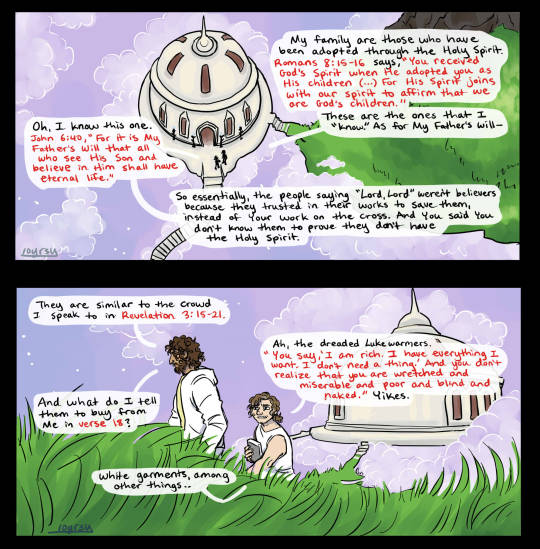


i decided to try something a little different. i often have these discussions in my head as i’m studying the Bible, but Apologetics can be heavy in text and hard to understand. so i thought.. well, i’m an artist. maybe i can make this more palatable. (the place they are at is my mindscape for prayer)
there are tons of places to go from here, and maybe i will in the future. but as someone who is coming out of a foundation of anxiety, this particular message is important to me. there is no condemnation for those that trust in the Lord and His work. He is capable of helping us and carrying us to the finish line 💙
transcript:
10: Y'know Lord, a lot of people read Matthew 7:21-23 and get scared. “Not everyone who calls out to Me, 'Lord! Lord!' will enter the Kingdom of Heaven.”
Jesus: “On judgment day many will say to M, 'Lord! Lord! We prophesied in Your name and performed miracles in Your name!' But I will reply, 'I never knew you. Get away from Me, you who break God's laws.' “ Let's think about this. What are the “works” of God?
10: Uhm.. oh! John 6:29, “Jesus told them, 'This is the only work God wants from you: Believe in the One He has sent.' “ So then, they didn't really believe in You? You said You don't know them.
Jesus: Now read Matthew 12:50.
10: “Anyone who does the will of My Father in heaven is My brother and sister and mother!”
Jesus: My family are those who have been adopted through the Holy Spirit. Romans 8:15-16 says, “You received God's Spirit when He adopted you as His children (…) For His Spirit joins with our spirit to affirm that we are God's children.” These are the ones that I “know.” As for My Father's will-
10: Oh, I know this one. John 6:40, “For it is My Father's will that all who see His Son and believe in Him shall have eternal life.” So essentially, the people saying “Lord, Lord” weren't believers because they trusted in their works to save them, instead of Your work on the cross. And You said You don't know them to prove they don't have the Holy Spirit.
Jesus: They are similar to the crowd I speak to in Revelation 3:15-21.
10: Ah, the dreaded Lukewarmers. “You say, 'I am rich. I have everything I want. I don't need a thing.' And you don't realize that you are wretched and miserable and poor and blind and naked.” Yikes.
Jesus: And what do I tell them to buy from Me in verse 18?
10: White garments, among other things..
Jesus: Psalm 51:7 says, “Purify me from my sins and I will be clean; wash me, and I will be whiter than snow.” And 1 John 1:7 says, “The blood of Jesus, (God's) Son, cleanses us from all sin.” You, for example, are already in possession of white garments. My blood through My sacrifice cleansed them when you believed.
10: So the Lukewarmers don't believe in You either, because they trust in their wealth and possessions instead of You. But they say they're Christians just because they do to Church, or because their families are Christian.
Jesus: Born Again believers with the Holy Spirit never have to fear rejection from Me or My Father. “And this is the will of God, that I should not lose even one of those He has given Me, but that I should raise them up on the last day.” (John 6:3) As John 14:23 states, We will never take the Holy Spirit away once He's been given.
10: Once “Born Again”, no “unborning again” happening later, ey?
Jesus: Hahah! “No, I will not abandon you as orphans- I will come to you.” (John 14:18)
Jesus: “When everything is ready, I will come and get you so that you will always be with Me where I am.” (John 14:3)
#Christianity#Jesus Christ#God#the bible#Bible Verses#bible scripture#faithstuff#faith#heaven#apologetics#religion#religious art#digital illustraiton#digital comic#comics#long post.#my art#me.
194 notes
·
View notes
Text
It utterly baffles me how so many people seem to be unable to grasp the concept that atheists don't believe in any deities.

76 notes
·
View notes
Text

This is gonna be debunked easily
I know the Spanish Inquisition did a lot of killing, that's provable. Heretics, Jews, and others were killed but u think that can shake my faith in Christianity?
Christians had caused the Native American genocide. But it wasn't Christianity.
They didn't use God to justify the Native American genocide. They used money not God to justify slavery. In fact, Christian abolitionist movements, following the actual commands of the Bible, banned slavery. In Christianity, "there is neither Jew or Greek", so the Bible wasn't use to justify Nazism. In fact, Hitler was a hater of Christianity because he knew that Christianity teaches equality to all races.
If every Christian who was colonizing had carried out these two commands, history would be different:
No one would ever have been enslaved. You cannot enslave someone if you love them as yourself.
No one would ever have been forcibly relocated. You cannot kick people out of their homes if you are loving them as you love yourself.
No one would ever have been abused, taken advantage of, lied to, or murdered. You cannot treat someone that way if you love them as yourself.
No one would have obsessed over seizing gold, land, or power. If you love God with all your heart, there is no room left for greed, lust, or domineering power.
So in the end, its not the religion to blame
#christianity#religion#atheism#history#history of religion#catholicism#protestant#protestantism#apologetics#christianity changed the world#db-1986 debunked#judaism
17 notes
·
View notes
Text
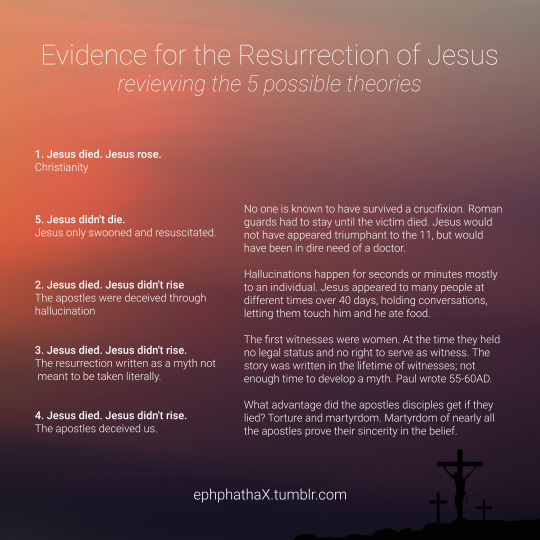
An evidence-based approach to Jesus resurrection. More reading at https://www.peterkreeft.com/topics-more/resurrection-evidence.htm
#jesus#resurrection#bible#catholic#DrPeterKreeft#apologetics#christian faith#christian doctrine#christianity#Christian#scripture#jesus christ#faith in jesus
21 notes
·
View notes
Text
In the spirit of Easter, I’m resurrecting this blog and opening up my ask box again for the first time in forever. Send me your questions and help me dust off the cobwebs from this ‘ol blog
12 notes
·
View notes
Text
Almost all arguments for theism are problematically sectarian
Why do atheists and agnostics not find the arguments for theism persuasive? According to some less-charitable theists, this is due to emotional resistance to theism. According to other more-charitable theists, this is due to some nebulous conception of reasonable disagreement, or because God does not reveal his existence to everyone. According to some atheists and agnostics, it is because the arguments for theism are weak. I suggest an explanation which overlaps with some albeit not all of the above.
Many defenses of traditional theism (including positive arguments for theism and rebuttals to arguments for atheism) hinge upon controversial principles in metaphysics, epistemology, or ethics. These tend to be principles which many atheists and agnostics reject or do not see reason to accept. This makes such defenses of classical theism unpersuasive—even if such arguments are sound *and* atheists & agnostics are reasonable.
In fact, I think this problem applies to nearly every popular argument for theism. They ALL hinge on controversial premises in metaphysics, epistemology, or ethics—ALL principles which are disproportionately rejected, or not accepted, by atheists and agnostics. For brief illustration, I will below give several representative examples.
Many versions of the cosmological (or first-cause) argument for theism are successful only if the first-cause needs to be personal (or person-like), which seems to require something in the ballpark of mind-body dualism or libertarian free will, which atheists tend to reject. This is in addition to how the Kalam cosmological argument requires controversial views in philosophy of infinity. However, I am here assuming that such views in philosophy of infinity are true and thus that there must be a temporal first cause. The temporal first cause is shown to be God (in a traditional sense) only if it must be personal rather than nonpersonal. And this requires controversial premises from philosophy of personhood, agency, mind, or free will—which atheists and agnostics tend to reject or not accept. Otherwise, it cannot be shown that the first cause can’t be an impersonal quantum vacuum state or suchlike.
Similarly, many versions of the argument from design (such the fine-tuned universe argument, which is by far the most credible such argument) are successful only if a personal designer is a superior explanation than an impersonal (non-) designer. But a personal designer only has greater explanatory value if we make controversial assumptions in fields such as philosophy of personhood, agency, mind, or free will—which again atheists and agnostics tend to reject or not accept. Notably, my observation here is entirely independent of controversies around multiverse hypotheses. Even if multiverse hypotheses are false, scientifically poor, or philosophically unsound, this gives very little comfort to fine-tuning arguments for theism—unless theism offers superior explanations, via appeal to controversial metaphysical theories, which atheists and agnostics tend not to accept.
Moral arguments for theism overwhelmingly rely on non-naturalist moral realism, which many atheists and agnostics (especially among non-philosophers) reject. If moral naturalism or moral anti-realism or moral weak realism is true or justified (either in general, or to atheists and agnostics), then atheists and agnostics have no reason to see moral arguments as providing any grounds for theism. I leave open the question of whether atheist moral non-naturalists should find theism compelling.
Arguments from consciousness only succeed if some kind of mind-body dualism (or something in this ballpark) is true, which many atheists and agnostics reject.
Some logic-based transcendental arguments for theism succeed only if something in the ballpark of Mathematical-Logical Platonism is true, which many atheists reject. Here I’m inclined to make a disjunction: I’m too unfamiliar with the arguments on this topic, so for now to me it is not clear whether Platonism is true, but *if* Platonism is true then it probably does not require theism.
The problem of divine hiddenness is an argument for atheism which claims (roughly) that God has not revealed his existence to atheists & agnostics, and that the best explanation for this datum is God’s nonexistence. One common theistic response is that God has revealed God’s existence to everyone. However, this response is parasitic on the assumption that at least some of the arguments for theism are persuasive enough that they ought to persuade atheists and agnostics—which I argue they need not do (since they rely on sectarian theories), even if they are sound arguments.
There are a variety of non-evidentialist defenses of theism. Atheists and agnostics tend to either be evidentialists or to hold mild non-evidentialist theories which do not lend significant support to theism, and which likely lend even less support to particular sectarian theistic positions such as the traditional forms of Christianity and Islam. Appealing to non-evidentialist epistemological theories (as a persuasive maneuver, at least) is thus likely to be a non-starter.
I think on commonsense ethics and on nearly all secular ethical views, it is pretty clear that when we can prevent horrific evils, then we should. Hence, the fact that God does not prevent horrific evils provides a powerful piece of commonsensical and secular-theoretical ethical evidence that God (as construed as perfectly good & all-powerful) does not exist. Theistic attempts to explain away the problem of evil may be successful—but *only* when assuming highly sectarian ethical principles, which nearly all atheists and agnostics see as wildly implausible. A very good person wouldn’t allow children to starve to death if he or she can easily prevent it. If you think God would do so, then either you think God has a really good reason to allow children to starve (which is a highly revisionist ethical theory), OR you think God is very good despite not needing a reason to allow children to starve (which is also a highly revisionist ethical theory). (Alternatively, God may be morally imperfect or not all-powerful—these nonstandard versions of theism are not targeted by the argument.)
A big final question: Are arguments for atheism, and/or responses to arguments for theism, also highly sectarian? I think less so, but arguing for this claim is beyond the scope of this post.
22 notes
·
View notes
Text
"If I find myself a desire which no experience in this world can satisfy, the most probable explanation is that I was made for another world. If none of my earthly pleasures satisfy it, probably earthly pleasures were never meant to satisfy it."
C.S. Lewis
#catholic#existentialism#philosophy#poetry#quotes#apologetics#c s lewis#Christian#god#poem#heaven#hell#religion#religious trauma#spirituality#spiritual quotes#spiritual awakening#spiritual knowledge#spiritualhealing
21 notes
·
View notes
Text
"Praying to Mary is a false, pagan belief, adopted by the Catholic church".
That, in actuality, isn't true.
This is a false teaching that is perpetuating throughout Protestant denominations (you know, the churches that have only been around for a couple decades 😉).
"Praying to Mary", doesn't mean what the new new churches on the block say.
It's a gross simplification of language.
The word "pray" is to ask a request.
In the old world you'll see sayings like "Praytel" or "I pray you", very common if you read Arthurian stories or Sherlock Holmes, etc.
This means, "I am asking you to do something for me".
For example "Praytel, what did thou mean by this?".
Or "I pray you, confess to me your inner longing in this matter".
This was old world speech.
The same is true for us catholic.
When we "Pray to a saint", we are not "praying to a saint", but rather asking that they say a prayer for us.
You see, Catholics truly believe in the power of the resurrection, and to be "away from the body is to be alive in Christ".
When you die, and died without sin, we believe you are at peace with our Lord, Jesus Christ.
And that you are still an active member of the family of God.
We know that people pray for us in heaven, (According to the Bible, Revelation 5:8 and 8:3-4 say that saints and angels in heaven present prayers to God on behalf of people on earth. This suggests that the saints and angels have received the prayers as intermediaries to God.)
So we are merely asking them to say a prayer for us, as we believe in Jesus and his dominion over life and death.
Just as here on earth, when we ask someone to say a prayer for us, we believe firmly that saints and those that have passed on, all of them that were in the faith, as members of our eternal family, can pray for us.
Because death doesn't exist for a true believer, it is only the passing of our physical self from this life to the next.
One family, under God, mediated by his one son, Jesus Christ, and prayerfully united together without borders.
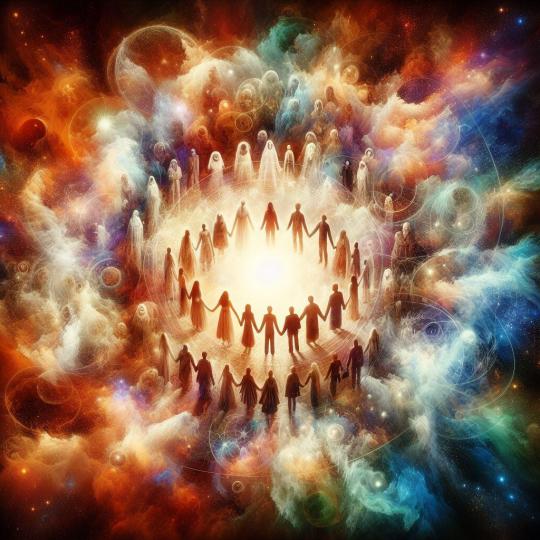
7 notes
·
View notes
Text
What comes after neoliberalism?

In his American Prospect editorial, “What Comes After Neoliberalism?”, Robert Kuttner declares “we’ve just about won the battle of ideas. Reality has been a helpful ally…Neoliberalism has been a splendid success for the top 1 percent, and an abject failure for everyone else”:
https://prospect.org/economy/2023-03-28-what-comes-after-neoliberalism/
If you’d like an essay-formatted version of this post to read or share, here’s a link to it on pluralistic.net, my surveillance-free, ad-free, tracker-free blog:
https://pluralistic.net/2023/03/28/imagine-a-horse/#perfectly-spherical-cows-of-uniform-density-on-a-frictionless-plane
Kuttner’s op-ed is a report on the Hewlett Foundation’s recent “New Common Sense” event, where Kuttner was relieved to learn that the idea that “the economy would thrive if government just got out of the way has been demolished by the events of the past three decades.”
We can call this neoliberalism, but another word for it is economism: the belief that politics are a messy, irrational business that should be sidelined in favor of a technocratic management by a certain kind of economist — the kind of economist who uses mathematical models to demonstrate the best way to do anything:
https://pluralistic.net/2022/10/27/economism/#what-would-i-do-if-i-were-a-horse
These are the economists whose process Ely Devons famously described thus: “If economists wished to study the horse, they wouldn’t go and look at horses. They’d sit in their studies and say to themselves, ‘What would I do if I were a horse?’”
Those economists — or, if you prefer, economismists — are still around, of course, pronouncing that the “new common sense” is nonsense, and they have the models to prove it. For example, if you’re cheering on the idea of “reshoring” key industries like semiconductors and solar panels, these economismists want you to know that you’ve been sadly misled:
https://foreignpolicy.com/2023/03/24/economy-trade-united-states-china-industry-manufacturing-supply-chains-biden/
Indeed, you’re “doomed to fail”:
https://www.piie.com/blogs/trade-and-investment-policy-watch/high-taxpayer-cost-saving-us-jobs-through-made-america
Why? Because onshoring is “inefficient.” Other countries, you see, have cheaper labor, weaker environmental controls, lower taxes, and the other necessities of “innovation,” and so onshored goods will be more expensive and thus worse.
Parts of this position are indeed inarguable. If you define “efficiency” as “lower prices,” then it doesn’t make sense to produce anything in America, or, indeed, any country where there are taxes, environmental regulations or labor protections. Greater efficiencies are to be had in places where children can be maimed in heavy machinery and the water and land poisoned for a millions years.
In economism, this line of reasoning is a cardinal sin — the sin of caring about distributional outcomes. According to economism, the most important factor isn’t how much of the pie you’re getting, but how big the pie is.
That’s the kind of reasoning that allows economismists to declare the entertainment industry of the past 40 years to be a success. We increased the individual property rights of creators by expanding copyright law so it lasts longer, covers more works, has higher statutory damages and requires less evidence to get a payout:
https://chokepointcapitalism.com/
At the same time, we weakened antitrust law and stripped away limits on abusive contractual clauses, which let (for example) three companies acquire 70% of all the sound recording copyrights in existence, whose duration is effectively infinite (the market for sound recordings older than 90 is immeasurably small).
This allowed the Big Three labels to force Spotify to take them on as co-owners, whereupon they demanded lower royalties for the artists in their catalog, to reduce Spotify’s costs and make it more valuable, which meant more billions when it IPOed:
https://pluralistic.net/2022/09/12/streaming-doesnt-pay/#stunt-publishing
Monopoly also means that all those expanded copyrights we gave to creators are immediately bargained away as a condition of passing through Big Content’s chokepoints — giving artists the right to control sampling is just a slightly delayed way of giving labels the right to control sampling, and charge artists for the samples they use:
https://doctorow.medium.com/united-we-stand-61e16ec707e2
(In the same way that giving creators the right to decide who can train a “Generative AI” with their work will simply transfer that right to the oligopolists who have the means, motive and opportunity to stop paying artists by training models on their output:)
https://pluralistic.net/2023/02/09/ai-monkeys-paw/#bullied-schoolkids
After 40 years of deregulation, union busting, and consolidation, the entertainment industry as a whole is larger and more profitable than ever — and the share of those profits accruing to creative workers is smaller, both in real terms and proportionally, and it’s continuing to fall.
Economismists think that you’re stupid if you care about this, though. If you’re keeping score on “free markets” based on who gets how much money, or how much inequality they produce, you’re committing the sin of caring about “distributional effects.”
Smart economismists care about the size of the pie, not who gets which slice. Unsurprisingly, the greatest advocates for economism are the people to whom this philosophy allocates the biggest slices. It’s easy not to care about distributional effects when your slice of the pie is growing.
Economism is a philosophy grounded in “efficiency” — and in the philosophical sleight-of-hand that pretends that there is an objective metric called “efficiency” that everyone can agree with. If you disagree with economismists about their definition of “efficiency” then you’re doing “politics” and can be safely ignored.
The “efficiency” of economism is defined by very simple metrics, like whether prices are going down. If Walmart can force wage-cuts on its suppliers to bring you cheaper food, that’s “efficient.” It works well.
But it fails very, very badly. The high cost of low prices includes the political dislocation of downwardly mobile farmers and ag workers, which is a classic precursor to fascist uprisings. More prosaically, if your wages fall faster than prices, then you are experiencing a net price increase.
The failure modes of this efficiency are endless, and we keep smashing into them in ghastly and brutal ways, which goes a long way to explaining the “new commons sense” Kuttner mentions (“Reality has been a helpful ally.”) For example, offshoring high-tech manufacturing to distant lands works well, but fails in the face of covid lockdowns:
https://locusmag.com/2020/07/cory-doctorow-full-employment/
Allowing all the world’s shipping to be gathered into the hands of three cartels is “efficient” right up to the point where they self-regulate their way into “efficient” ships that get stuck in the Suez canal:
https://pluralistic.net/2021/03/29/efficient-markets-hypothesis/#too-big-to-sail
It’s easy to improve efficiency if you don’t care about how a system fails. I can improve the fuel-efficiency of every airplane in the sky right now: just have them drop their landing gear. It’ll work brilliantly, but you don’t want to be around when it starts to fail, brother.
The most glaring failure of “efficiency” is the climate emergency, where the relative ease of extracting and burning hydrocarbons was pursued irrespective of the incredible costs this imposes on the world and our species. For years, economism’s position was that we shouldn’t worry about the fact that we were all trapped in a bus barreling full speed for a cliff, because technology would inevitably figure out how to build wings for the bus before we reached the cliff’s edge:
https://locusmag.com/2022/07/cory-doctorow-the-swerve/
Today, many economismists will grudgingly admit that putting wings on the bus isn’t quite a solved problem, but they still firmly reject the idea of directly regulating the bus, because a swerve might cause it to roll and someone (in the first class seats) might break a leg.
Instead, they insist that the problem is that markets “mispriced” carbon. But as Kuttner points out: “It wasn’t just impersonal markets that priced carbon wrong. It was politically powerful executives who further enriched themselves by blocking a green transition decades ago when climate risks and self-reinforcing negative externalities were already well known.”
If you do economics without doing politics, you’re just imagining a perfectly spherical cow on a frictionless plane — it’s a cute way to model things, but it’s got limited real-world applicability. Yes, politics are squishy and hard to model, but that doesn’t mean you can just incinerate them and do math on the dubious quantitative residue:
https://locusmag.com/2021/05/cory-doctorow-qualia/
As Kuttner writes, the problem of ignoring “distributional” questions in the fossil fuel market is how “financial executives who further enriched themselves by creating toxic securities [used] political allies in both parties to block salutary regulation.”
Deep down, economismists know that “neoliberalism is not about impersonal market forces. It’s about power.” That’s why they’re so invested in the idea that — as Margaret Thatcher endlessly repeated — “there is no alternative”:
https://pluralistic.net/2021/11/08/tina-v-tapas/#its-pronounced-tape-ass
Inevitabilism is a cheap rhetorical trick. “There is no alternative” is a demand disguised as a truth. It really means “Stop trying to think of an alternative.”
But the human race is blessed with a boundless imagination, one that can escape the prison of economism and its insistence that we only care about how things work and ignore how they fail. Today, the world is turning towards electrification, a project of unimaginable ambition and scale that, nevertheless, we are actively imagining.
As Robin Sloan put it, “Skeptics of solar feasibility pantomime a kind of technical realism, but I think the really technical people are like, oh, we’re going to rip out and replace the plumbing of human life on this planet? Right, I remember that from last time. Let’s gooo!”
https://www.robinsloan.com/newsletters/room-for-everybody/
Sloan is citing Deb Chachra, “Every place in the world has sun, wind, waves, flowing water, and warmth or coolness below ground, in some combination. Renewable energy sources are a step up, not a step down; instead of scarce, expensive, and polluting, they have the potential to be abundant, cheap, and globally distributed”:
https://tinyletter.com/metafoundry/letters/metafoundry-75-resilience-abundance-decentralization
The new common sense is, at core, a profound liberation of the imagination. It rejects the dogma that says that building public goods is a mystic art lost along with the secrets of the pyramids. We built national parks, Medicare, Medicaid, the public education system, public libraries — bold and ambitious national infrastructure programs.
We did that through democratically accountable, muscular states that weren’t afraid to act. These states understood that the more national capacity the state produced, the more things it could do, by directing that national capacity in times of great urgency. Self-sufficiency isn’t a mere fearful retreat from the world stage — it’s an insurance policy for an uncertain future.
Kuttner closes his editorial by asking what we call whatever we do next. “Post-neoliberalism” is pretty thin gruel. Personally, I like “pluralism” (but I’m biased).
Have you ever wanted to say thank you for these posts? Here's how you can do that: I'm kickstarting the audiobook for my next novel, a post-cyberpunk anti-finance finance thriller about Silicon Valley scams called Red Team Blues. Amazon's Audible refuses to carry my audiobooks because they're DRM free, but crowdfunding makes them possible.
http://redteamblues.com
[Image ID: Air Force One in flight; dropping away from it are a parachute and its landing gear.]
#pluralistic#crypto forks#economism#imagine a horse#perfectly spherical cows of uniform density on a frictionless plane#neoliberialism#inevitabilism#tina#free markets#distributional outcomes#there is no alternative#supply chains#graceful failure modes#law and political economy#apologetics#robert kuttner#the american prospect
69 notes
·
View notes
Photo
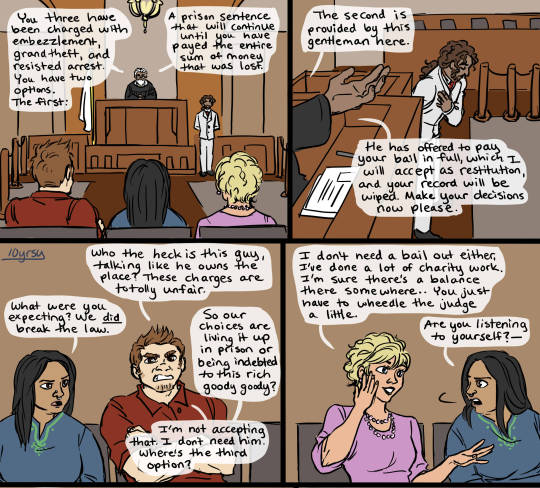

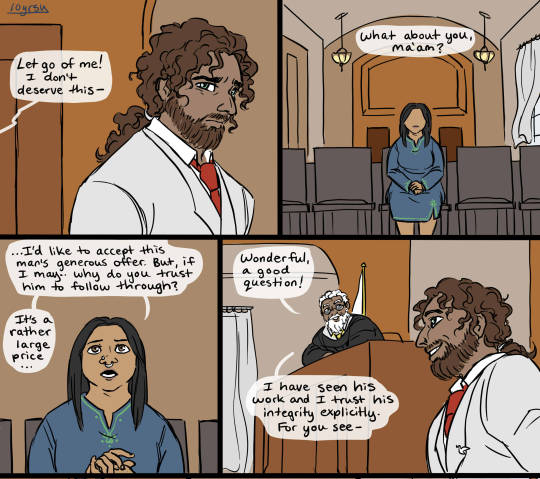


“Restitution: an act of restoring, or a condition of being restored”
None of us are perfect and so all of us have broken God’s Law. Good deeds can’t erase wrongs, just as you can’t recapture words that have left your mouth. But God loved us so much that He provided the payment for our sins instead. “He cancelled the record of the charges against us and took it away by nailing it to the cross.” (Colossians 2:14)
Just as these people had a choice to accept the offer of legal freedom, we also have the choice to accept Jesus’ payment for us, and His freedom. “For God has rescued us from the kingdom of darkness and transferred us into the Kingdom of His dear Son, who purchased our freedom and forgave our sins.” (Colossians 1:13-14)
Don’t rely on the good things you do as a ticket to Heaven. Only perfection is allowed into God’s home. Which is why Jesus, who lived a perfect life and died in our place, is the only way to be made perfect in God’s eyes. His righteousness covers us when we believe. A third option isn’t there; you either live with Him or live separated from Him forever. Believe in Jesus and accept His offer of payment and eternal life, for He loved you enough to pay it all so you can live. 💙
“For the wages is death, but the free gift of God is eternal life through Christ Jesus our Lord.” (Romans 6:23)
transcript:
Judge: You three have been charged with embezzlement, grand theft, and resisted arrest. You have two options. The first: A prison sentence that will continue until you have payed the entire sum of money that was lost. The second is provided by this gentleman here. He has offered to pay your bail in full, which I will accept as restitution, and your record will be wiped. Make your decisions now please.
Red Man: Who the heck is this guy, talking like he owns the place? These charges are totally unfair.
Blue Woman: What were you expecting? We did break the law.
Red Man: So our choices are living it up in prison or being indebted to this rich goody goody? I'm not accepting that. I don't need him. Where's the third option?
Purple Woman: I don't need a bail out either, I've done a lot of charity work. I'm sure there's a balance there somewhere.. You just have to wheedle the judge a little.
Blue Woman: Are you listening to yourself?-
Judge: Have you made your decisions?
Red Man: Yeah, I refuse! Who made it a crime to borrow a lil' money here and there? It's a free country, ain't it? Actually, it's a crime to discriminate against me like this!
Judge: So you have chosen the first option. I am truly sorry to hear this, Sir. Very well, officers, if you would-
Red Man: Hey, get your hands off me!
Judge: And you, ma'am?
Purple Woman: You see, Judge, I've worked with many nonprofits and charities over the years. They can vouch for me! I'm not really a bad person, this was just a little lapse in judgment, that's all.
Judge: I'm afraid it doesn't matter how many good works you've done, ma'am. The law is still the law, and you've broken it. If you do not accept the pardon you've been offered, you must accept the consequences of your actions.
Purple Woman: Let go of me! I don't deserve this-
Judge: What about you, ma'am?
Blue Woman: ..I'd like to accept this man's generous offer. But, if I may.. Why do you trust him to follow through? It's a rather large price...
Judge: Wonderful, a good question! I have seen his work and I trust his integrity explicitly. For you see- He is my Son.
Yeshua: Congratulations!
Blue Woman: Thankyou.. Thankyou so much! How can I ever repay you?!
Yeshua: I don't want your payment, I'm satisfied that you're free.
Blue Woman: But why?
Yeshua: Let's take a walk together for a bit and get to know each other. I'm doing something quite exciting, and I want you to be a part of it.
#christianity#Jesus Christ#God#religion#religious art#the bible#Bible Verses#heaven#salvation#faithstuff#faith#apologetics#digital comic#comics#my art
177 notes
·
View notes
Text

Starting the year with C.S. Lewis.
It’s so cool that he dedicated this book to Tolkien.
#c. s. lewis#the screwtape letters#reading#books books books#books and reading#books#christianity#christian writer#apologetics#epistolary
10 notes
·
View notes
Text

The Three Laws of Creationist Apologetics
The First Law
Faith in Creation can never be destroyed. In a closed mind, the level of ignorance must always remain equal.
The Second Law
Creationists will always conflate separate scientific fields of study. As a result, all conversations tend towards entropy.
The Third Law
In any conversation, the replies that are simply links to "scientiif" creationist articles, tends towards constant, as the understanding of those articles approaches absolute zero.
#creationism#creationist nonsense#apologetics#religious apologetics#christian apologetics#science illiteracy#religion#religion is a mental illness
15 notes
·
View notes
Text
don't you find interesting that whenever bad stuff happens, people automatically point their fingers towards God and not satan?
"what does God do about war?"
That's satan. That's not God who told Humans to build weapons and kill each others.
"what God does for all the people starving in the world?"
That's satan. God commends people to give to the poor and act in righteousness. The elite greediness and unholy politics is what made wealth distribution so bad that so many people fail living properly.
"why God did nothing when my parents were violent?"
That's satan. Satan is the master of war, violence and chaos. He's the one who instigated rebellion in the kindgom of God. God unequivocally condemns violence and commands parents to be good with their child. Humans giving into violence is the result of their own (bad) decision.
Unlike popular belief, God didn't make us to be mindless robots wired to only do what He wanted. Never forget that even His own angels rebelled against Him ..
Before complaining about God not doing enough (which is funny because you guys NEVER acknowledge all wonderful things and blessings He's providing for you on the regular) ask yourself why satan DOES what he do.
18 notes
·
View notes
Text
When debating Christians about the veracity of the Gospels, remember that the disciples of Christ were fictional characters as well, and their testimony about seeing the resurrection was also made up by the authors who wrote the fictional life of Jesus in the first place. The Acts of the Apostles in particular is a historical novel, not a documentary.
5 notes
·
View notes
Text
Disclaimer, before I get into this: I do not believe a god of any kind exists. Some people believe the god of the Bible exists as a single entity among many other entities, and to that I say, to each their own. I personally do not hold that belief, so when I talk about what god could have done or what god is and isn’t, this is in a purely hypothetical sense. It is to draw attention to the inconsistencies in the way the Christian god is presented, in hopes that his followers might recognize a bit of their cognitive dissonance and realize they could look at things a lot more objectively.
Moving on~
The following image is a screenshot of part of a post I made last week. The entire thing is not relevant to this specific discussion, so I’ve only included two specific paragraphs, although if you’d like to read the whole thing I can post it here too. (The image description is in the alt text.)

In the comment section of this post, a Christian woman replied:

I’m going to break down these analogies because I am seriously so sick of seeing people repeat them as if they actually make any sense at all.
To start, her analogy of the lion’s den is omitting the fact that my hypothetical father in this scenario not only created the den and put the lions in it, but then also put me into it. Then he saved me, and expected me to be grateful and worship him and decide “wow, he saved me so I guess he must love me pretty much! guess that means I have to follow every rule he sets for me now!” She also makes it sound as if there are only two choices: worship this convoluted father with a praise kink, or else jump back into the pit of lions. When in reality, what’s stopping me from simply walking away from it all? Is the den and the ground around it the only thing that exists in this world? Because I would assume if I keep walking, I would keep finding ground to walk on. And eventually I’d come to a place where my father isn’t, and I’d probably just stay there.
In the second comment she uses the example of a couple who decided to set boundaries in their relationship. Right off the bat, this argument is completely invalidated by the simple fact that there is no equal partnership between a person and “God”. There is a massive power imbalance, in which no form of equality can ever exist. Even setting that to the side, though, we need to acknowledge that these are not “boundaries”, in the sense that all parties must abide by them or else part ways. They are rules, and only the non-God party has to follow them.
In a separate post I made a while ago about my issues with the god of the Bible, I brought up the fact that the true biblical God cannot be loving. He supposedly led the nation of Judah on a colonization campaign through the ancient Middle East, giving them full permission to slaughter entire cities, take all their shit, and keep their women as slaves. I said that I cannot in good conscience follow a god who says murder is wrong, but then explicitly instructs his “chosen people” to murder thousands upon thousands of people just because they were “gentiles” living on the land promised to them by that same god. In the comments of that post, another woman said this, which is a very common belief in Christianity:

This is why I hate the concept of “sin” as a whole. It’s not bad because it’s bad, it’s bad because god said so. Which means he can also say something completely different, and that makes it okay but just for him. Murder isn’t murder when god kills someone. Stealing isn’t stealing if god said you could have it. Rape isn’t rape if god told you that you could keep that woman as a slave.
So in the analogy of a woman and her partner, these are not boundaries like “we can’t hit each other or fight, we can’t lie to each other or cheat”. They are rules that say “you can’t hit me or talk back, you can’t keep things from me or leave this relationship. but me? I can do whatever I want”.
The god of the Bible is not a loving deity. He is a control freak who is perfectly happy to let you suffer for all eternity if you decide you don’t like the way he runs things. I see a lot of Christians in my comments constantly, telling me that god didn’t decide to punish you for not loving him. It’s just a natural consequence; if you decide to be separated from him, his protection doesn’t work and that’s why it’s torment.
To that I always say, why? Why did god make a reality in which his protection only extends to those who worship him? Why did he make it so that we have to suffer if we’re apart from him? He’s all-powerful right? So couldn’t he have created a reality in which, whether you liked him or not, the outcome was the same? All people, regardless of faith, had an afterlife that didn’t torture them? I don’t know if it’s just that Christians have no imagination or what, because I can conceive of multiple ways in which suffering simply wouldn’t have to exist if I had made the world.
Of course the response I always get is “But you’d have to take people’s choice! We’d be robots!” And again I ask, why? God could have made it so that we could all only make choices within the bounds of what does not harm ourselves or others. He could’ve made it so that greed and hate and apathy simply didn’t exist in people’s minds, if he wanted to. And sure, maybe you’d say it isn’t fair to keep people from being able to make those choices. But I would say that in this hypothetical reality, we wouldn’t know the fucking difference. We would be happy. Everyone would have what they needed, no one would ever suffer.
Anyway, “free will” within Christianity does not exist. You cannot give true consent in an imbalanced power dynamic, or when saying “no” is unsafe, and god meets both those conditions.
This whole thing is another great example of how Christians actively believe a whole lot of directly conflicting things, but the indoctrination keeps them from seeing it.
#ex christian#tw christianity#debunking#ex religious#apologetics#god isn't real#the illusion of choice#heaven and hell#long post#image description in alt#screenshots#indoctrination#tw rape mention
8 notes
·
View notes